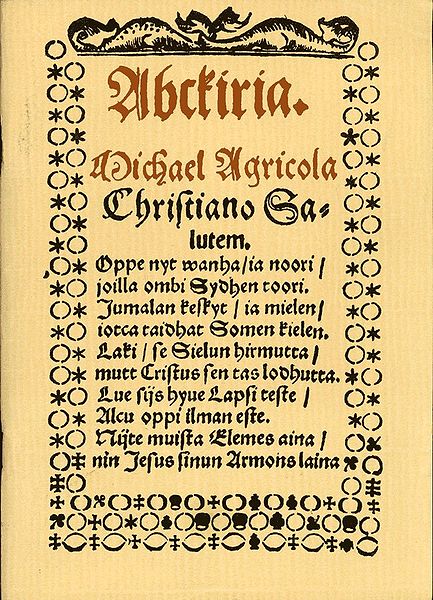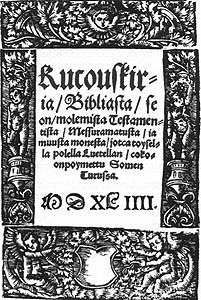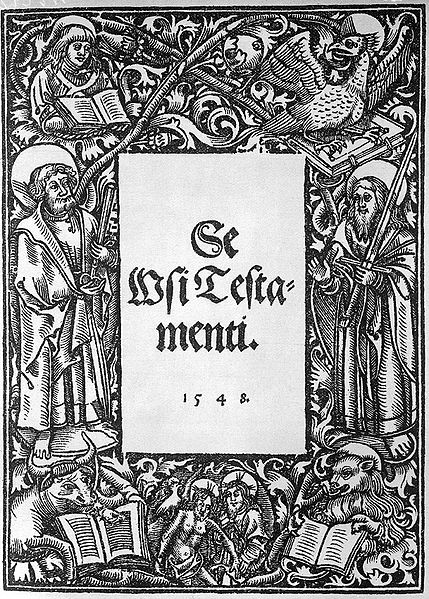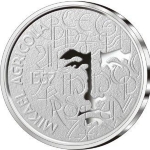Mikael Agricola was a clergyman who became a prominent proponent of the Protestant Reformation in Sweden including at the time Swedish territory Finland. He was also a gifted linguist, a learned theologian and a humanist with a wide knowledge extending to the natural sciences, the law and medicine. With his Bible translation he laid the foundations of standard Finnish, and now is often called the "father of literary Finnish".
Background
According to Paavali juusien's chronicle of bishops, Agricola was born "in Torsby village in the parish of Perna (Pcrnaja) in lower Nyland". The family estate, listed as Number 1 in the Torsby land register, was later named "Sigh-ids' after Agricolas nephew Sigfrid Minsson, who died in 1634. The farmstead was so wealthy that it was possible to hold district court sessions in the house.
The date of Agricolas birth is unknown, but his later history would place it at around 1510. His father was called Olavi, or Olof in Swedish; his mother’s name is unknown. Olavi appears to have died in the early 1540s, leaving a widow and four adult children: Mikael and three daughters whose names are not mentioned in documents. Agricolas mother died in about 1 550. Afterwards the bailiff of Savonlinna, Clemets Krook, who had married the eldest daughter, sold his share of the inheritance to Mikael. The estate was managed first by Thomas Larsson, the husband of the middle sister, and then, after his death in 1572, by the husband of the youngest sister, Mans Jonsson, whose son Sigfrid inherired it in 1592.
Education
Evidently the parish priest of Perni had noticed the boy's exceptional talent, because in about 1520 Agricola was sent off to school. According to Juusten, he "was taught the first principles of writing a school in Viborg, whose headmaster was Master Johannes Erasmi, a strict and dedicated educator of young scholars". In Viborg, Mikael first came into contact with both humanism and the reformation. The Baltic countries belonged to the German cultural sphere of influence, and new trends spread there quickly. Scholars were already reading the work of Erasmus of Rotterdam in the second decade of the 16th century, and humanism was paving the way for the Reformation. The new doctrine was being preached in Rip in 1521, and three Tears later in Tallinn (Reval). In spring 1524 a wave of iconoclasm began in Riga, and it spread to other towns, including Tami and Tallinn. It soon subsided, but the news was still fresh when it reached Viborg. From 1525 onwards, Viborg Castle was governed by Count Johann of Hoija and Bruchhausen, a German condottiere, who had served Gustavus Vasa and had received as a reward the hand of the king’s sister Margarera Eriksdotter Vasa and me provinces of Viborg and Savonlinna (Nyslott). The count was a supporter of the Reformation, and thus it became possible to hold Lutheran services in the castle chapel while Agricola was still a schoolboy. The name Agricola, which means farmer and which is first documented in 1531, was adopted by the grammar-school pupil Mikael Olofsson during his school days in Viborg. The name was quite popular in humanist circles in Germany.
In 1528 Agricola followed his teacher to Turku (Åbo), then the center of the Finnish side of the Swedish realm and the capital of the bishopric. There Agricola became a scribe in bishop Martinus Skytte's office. While in Turku Agricola met Martin Luther's first Finnish student Petrus Särkilahti, who eagerly spread the idea of the Reformation. Särkilahti died in 1529, and it was up to Agricola to continue Särkilahti's work. Agricola was ordained for priesthood circa 1531.
In 1536 the bishop of Turku sent Agricola to study in Wittenberg in Germany. He concentrated on the lectures of Philipp Melanchthon, who was an expert in Greek, the original language of the New Testament. In Wittenberg Agricola studied under Luther. Agricola got recommendations to Swedish King Gustav Vasa from both of the reformists. He sent two letters to Gustav, asking for a confirmation for a stipend. When the confirmation came, Agricola bought books (for example, the complete works of Aristotle). In 1537 he started translating the New Testament into Finnish.
Career
In 1539 Agricola returned to Turku and ended up as the rector of Turku (Cathedral) School. He did not like his job, calling his students "untamed animals". At the time Gustav Vasa had confiscated the property of the church when he was consolidating his power but he also drove the Reformation. In 1544 Agricola received an order from the crown to send several talented young men to Stockholm's taxing offices. For some reason, Agricola did not obey until the order was sent again the next year, with a more menacing tone. This episode probably affected their relations negatively.
In 1546 Agricola lost his home and school in the Fire of Turku. On 22 February 1548, Gustav Vasa ordered Agricola to retire from his position as a rector. At this time Agricola was already married, but history knows his wife only by her name: Pirjo Olavintytär (Bridget, "daughter of Olavi"; Birgitta Olafsdotter, Brigida Olaui). His only son, Christian Agricola (Christianus Michaelis Agricola), was born 11 December 1550, and became the bishop of Tallinn in 1584.
When an old bishop died in 1554, Gustav Vasa had Agricola consecrated as the ordinarius of Turku parish – for all practical purposes Bishop of Turku and by extension the first Lutheran bishop for all Finland. Agricola was not a particularly strict or dedicated reformer, although he did remove the Canon of the Mass.
In 1557 Agricola joined the delegation going to Russia and was in Moscow from 21 February to 24 March negotiating a peace treaty, the Treaty of Novgorod (1557). On 9 April he fell ill and died in Uusikirkko (now Polyane) village, part of the Kyrönniemi parish on the Karelian Isthmus. This day is also Elias Lönnrot's birthday and it is celebrated in Finland as the day of the Finnish language. Agricola was buried inside Viipuri's church, but the exact location of the grave is not known.
He is commemorated as a bishop by the Evangelical Lutheran Church in America on 10 April.









